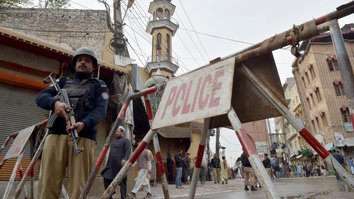PESHAWAR -- The "Islamic State of Iraq and Syria" (ISIS) suicide bomber who killed 64 people at a Shia mosque in Peshawar last week was an Afghan exile who returned home to train for the attack, police said Wednesday (March 9).
Twenty suspects were arrested and three "facilitators" of the attack were killed in an overnight raid following the March 4 attack, according to officials.
"All the three suspects behind the deadly blast have been identified," Interior Minister Sheikh Rasheed Ahmad said in a video posted on Twitter Sunday, two days after the blast.
"We have broken the network and also accessed the family of the suicide bomber," said Peshawar Capital City Police Officer Muhammad Ijaz Khan, according to Dawn.
Police investigators collected body parts and other evidence from the scene of the attack, he said.
"They also collected fingerprints from the pistol and spent bullet casings from the scene," he added.
The rickshaw the bomber used to reach the target has been impounded, said Khyber Pakhtunkhwa (KP) government spokesperson Muhammad Ali Saif.
Terrorists' haven
There have been warnings Afghanistan could become a recruiting ground and staging post for militants since the fall of the Afghan government in August.
Authorities have pledged they will not allow Afghan soil to be used to plot attacks on other nations, but last month the United Nations (UN) Security Council said "terrorist groups enjoy greater freedom there than at any time in recent history".
Two senior Pakistan police officials told AFP that the suicide bomber responsible for Friday's Peshawar blast had prepared the attack in Afghanistan.
It was claimed by ISIS, whose Khorasan branch (ISIS-K) has been active for years in both Pakistan and Afghanistan.
The attacker was an Afghan national in his 30s who moved to Pakistan with his family decades ago, said officials.
"The bomber went [back] to Afghanistan, trained there and returned without informing his family," one of the senior police officials told AFP.
"Islamic State-Khorasan is becoming a strong threat for us; they are operating from Afghanistan, but they have sleeper cells here," he added.
There is "a lot of apprehension" in the international community over the prospect of Afghanistan becoming a haven for militancy, said Muhammad Amir Rana, director of the Pak Institute for Peace Studies (PIPS).
Officials can rein in allied groups like al-Qaeda, but "they cannot guarantee they will do the same about the groups which are not under their control like ISIS-K", he said.
"There are a lot of questions" about the new leaders in Afghanistan, Rana said.
Since the fall of the previous Afghan government, Islamabad has acted as a key broker between the new authorities and the international community.
Tehreek-e-Taliban Pakistan (TTP) has staged attacks from hideouts in Afghanistan, testing the diplomatic relationship.
ISIS-K may be intensifying attacks in Pakistan in order to "increase pressure" from Islamabad on the authorities in Afghanistan, said Rana.
ISIS attack in Balochistan
ISIS also claimed responsibility for a suicide blast on Tuesday that killed seven members of the paramilitary Frontier Constabulary in Sibi district, Balochistan, less than 800 metres away from where Pakistani President Arif Alvi attended a function earlier in the day.
"The explosion happened some 25 minutes after the president left the area," senior police official Dostain Dashti told AFP.
Hashim Ghilzai, a senior administration official from Balochistan, confirmed the death toll.
In an unrelated security operation, the Pakistani military said seven militants had been killed in the province on Tuesday.
"In addition, a significant cache of arms and ammunition has also been recovered which was intended to be used in terrorist activities," it said in a statement.

![Policemen stand guard near a Shia mosque a day after a March 4 suicide bombing in Peshawar. Police identified the bomber using two severed feet found at the scene. [Abdul Majeed/AFP]](/cnmi_pf/images/2022/03/10/34422-000_324h9aj-585_329.jpg)






